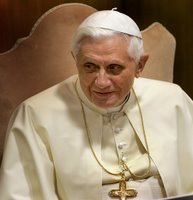I'd say that I'm in my first day of recovery from the flu, since today I can do basic things like a normal person without feeling winded, nauseated, or otherwise debilitated. While I've been sick, pretty much the only thing I've been able to do is lay around, watch TV, and read. I've just finished reading Matt Taibbi's
Spanking the Donkey: Dispatches from the Dumb Season. I highly recommend it; it reminded me of my reasons for leaving the Democratic Party, a reminder I needed as I have lately been succumbing to the old "lesser of two evils" and "electability" traps.
I became eligible to vote around the same time that I was involved in the Rite of Christian Initiation for Adults (RCIA), so since the very beginning I have looked at voting through the eyes of faith. The 2004 election season was an agonizing time for me, in which I almost decided to vote for President Bush based primarily upon his opposition to abortion rights. At the last minute, I voted for Sen. John Kerry (D-MA). The driving force behind both of these choices -- the initial choice to vote for Bush, and the last minute decision to vote for Kerry -- was the "lesser of two evils" mentality. Both candidates are really bad, but which candidate would do the least harm? This mentality is quite common among Catholic voters; I suspect the same is true among other Christian voters as well, and perhaps among other people of faith.
I wonder now what I was thinking. Christianity would look very different now if Jesus had opted for the "lesser of two evils." Christ believed that there was something seriously wrong with the Jewish religious and societal system; it's going too far to say that he believed the whole thing was evil, but it's not going too far to say that he saw very serious and very deep systemic problems. And he saw these problems among all of the various Jewish sects, or "parties" if you will. What would have happened to Christianity if Jesus had decided not to challenge the entire system, but rather to align himself with the sect that would have done the least harm in his view? What if he had opted for the Pharisees over the Sadducees, because at least the former believed in the resurrection? Or what if he had opted for the Essenes over the other two, because at least the Essenes had rejected the corrupt Temple system?
If Jesus had opted for the "lesser of two evils," Christianity as we know it would not exist. Jesus would never have found the strength to challenge the deep systemic problems within the Judaism of his day. He would never have found the strength to heal lepers, the most rejected of all outcasts in Jewish society at the time. He would never have found the strength to heal the paralytic and pronounce his sins forgiven. He would never have found the strength to not only forgive the woman caught in adultery, but to turn the whole situation around and transform it into a referendum on her accusers. He would never have found the strength to tell revolutionary parables like that of the Good Samaritan, or to drink water and share the Gospel with a Samaritan woman.
If Jesus had not found the strength to challenge the Jewish system of his day, Christianity would not exist today -- because it was based upon Jesus' own revolutionary and inclusive teaching that the Church later opened its arms to the Gentiles, an act which could never have been tolerated in the Jewish religious and societal system.
I see now how fruitless it is to accept one party over another in our governmental system, to believe that there can be any benefit in choosing the "lesser of two evils" in a system that is evil in and of itself. It doesn't much matter whether there's a Democrat or a Republican in office, because the Democrats and the Republicans are hardly the issue; they are only two faces of the corporate oligarchy that has complete control of our government and our society, an oligarchy which bought both parties before I was even born. The power of this oligarchy is obscured by the media, which is now also owned by the oligarchy. The media spins every campaign and election to make us believe that we're really making a crucial choice, when in fact the only choice we're making is how the same corporate oligarchy will continue its totalitarian rule for the next four years. Ours is a smart dictatorship, effectively hiding from the oppressed that we are under the rule of tyranny by keeping up the appearance of two party government and democratic elections.
Despite the media's best efforts, this inevitable oligarchy and the farcical nature of our elections became apparent during the last presidential election, but many of us still refused to see it. The two parties presented us with candidates who did not differ at all on the most important issues. On the matter of the Iraq War, the only difference between the opposition candidate and the incumbent was that the former would kill Iraqis
differently than the latter. On trade issues, inarguably the most important factor in our economic devastation, the only difference between Sen. Kerry and President Bush was that the former would toss economic justice and labor rights over his
left shoulder rather than his
right, while the President tossed them over his
right shoulder rather than his
left. On health care, the only difference between the Democrat and the Republican was that the former would substitute his own idiotic-failure-in-the-guise-of-a-real-plan for the President's.
There was only one Democrat who even came close to offering a real alternative to President Bush and the corporate oligarchy, and that was Rep. Dennis Kucinich (D-OH). Unlike the other Democrats, Kucinich opposed the Iraq War from the beginning and believed that our troops should have been withdrawn immediately. Several of the Democrats (including both Sen. Kerry and Sen. Edwards) voted for the war and for its continued funding in the Senate and the House, while the ones who didn't vote for the war wouldn't commit to troop withdrawal. Unlike the other candidates, Kucinich opposed NAFTA and other economically devastating "free trade" agreements and promised to withdraw from them. Several of the Democrats voted for NAFTA and other debilitating "free trade" agreements, while the ones who didn't vote for such agreements wouldn't commit to withdrawal from the agreements. Unlike the other candidates, Kucinich promised universal health care for all Americans. None of the other Democrats would commit to universal health care, and all of their plans would have left some Americans deprived of health care -- even though health care is recognized as a human right by the United Nations, and provided as a human right by the governments of most industrialized nations.
What happened to Rep. Kucinich? First, the corporate oligarchy's propaganda department, also known as our
free press, ignored and isolated him because he wasn't "electable." When he wouldn't go away quietly, the media ridiculed and laughed at him. And the American people followed the media's lead. I confess to being guilty of this myself, even being stupid enough to initially support the most shallow of the Democratic candidates, Sen. John Edwards (D-NC). And I confess that it was because I liked his hair, I liked his tan, and I liked his Southern accent.
There are no signs that this situation is going to change in time for 2008. Certainly not for 2006. None of the names floated for the 2008 Democratic primaries -- with the possible exception of Sen. Russ Feingold (D-WI) -- would represent any kind of significant change. It would be more business as usual, electing a President who will kill Iraqis
differently, who will screw America's workers
differently, who will deprive us of health care
differently. But any possibility that we'll stop killing Iraqis? Nay. Any possibility that we'll insist upon economic justice and labor rights? Nuh-uh. Any possibility that we'll extend health care to all Americans? No way. For Pete's sake, we may end up with Sen. Kerry, of all people, as the Democratic contender again -- his name appears in close proximity to Sen. Hillary Clinton (the early frontrunner) in every poll, often along with Sen. John Edwards, Gen. Wesley Clark, and even Al Gore. Maybe the Democrats' 2008 campaign slogan will be: "We Recycle!"
So who will get the Democratic nomination? If you're still asking this question, you're not getting it. The point of this whole post is to say that it doesn't matter, because the corporate oligarchy will ensure -- as it always does -- that whoever gets the Democratic nomination will be "one of them," a person (and probably a man) who governs only slightly differently than the Republicans in order to keep up the appearance that we still have a two party government and a stable democracy. Incidentally, I don't think Sen. Clinton will get the nomination; sure, she's the frontrunner now, but that's only because the people don't know the other candidates yet but know her very well -- you'll note that the ones who are directly behind her in the polls are also candidates the people know, but don't like as much (Kerry, Edwards, and Gore, oh my). I suspect that, when the time comes, the media will screw Clinton over with the "electability" card -- and I strongly suspect that Sen. Evan Bayh (D-IN), fiercely loyal to the corporate-controlled Democratic Leadership Council, will get the nomination.
But like I said:
It doesn't matter!It all sounds pretty hopeless, but I don't think that it is. Even though our democracy has been locked away for decades by the corporate oligarchy, the fact of the matter is that the people still have the power -- which is why the corporate oligarchy doesn't opt for outright fascism. We can change the course of our government and our society, but not by simply going to the polls and electing the guy the media tells us to, or the person we see as the "lesser of two evils." We have to stop listening to the media, stop listening to buzz-words like "electability," and start listening to our minds and our hearts. They're a bit rusty, perhaps, but most of them still work. Part of this is about doing what many Americans are terrified of doing: thinking outside the box. If I have to draw a picture for you, it's time to start electing independent or third party candidates who aren't funded and thus controlled by the corporate oligarchy.
We shy away from independent and third party candidates, often afraid to even consider voting for them. Why? Because we are told, again and again, that the threat to our nation is too great to risk losing to "the other guy" by giving too many votes, but not enough votes, to an independent or third party candidate. We've seen it a million times -- with Clinton and Dole, with Bush and Gore, with Bush and Kerry. No to Ralph Nader, no to David Cobb, no to Michael Badnarik, and all because Clinton, Gore, and Kerry
had to win. Sisters and brothers, I have two things for you to consider:
- The Democrats are losing anyway! Do you see a President Gore or a President Kerry in the White House? No, and although they love to blame the former defeat on Ralph Nader, the latter candidate lost even though Nader and other independent/third party candidates were removed from ballots across the country.
- The Republicans are only going to destroy our nation and the world slightly faster than the Democrats, but either way, they're both still going to destroy our nation and the world -- because they're still serving the same greedy, power-hungry creeps bent on having and consuming (and by consuming, destroying) everything. Voting for either party is a vote for the destruction of our nation and the world -- so how can voting for someone else be worse?
And that brings me to my final and most disturbing point. In response to the manipulation of the political discourse by the Religious Right in the 2000 and 2004 elections, a new coalition has come together to build the Religious Left. I have been and remain supportive of this initiative, but not if it's going to become for the Democrats what the Religious Right has become for the Republicans. For one thing, such an endeavor would be completely hypocritical. It's natural for the Religious Right, which does not believe in the Separation of Church and State, to illegally intervene in elections and use their religious influence to get their candidates elected, expecting in return an imposition of their beliefs upon all Americans. But this would be unacceptable for the Religious Left, we who do believe in the Separation of Church and State. How can we say that we believe in this fundamental constitutional principle but then seek to intervene in elections on behalf of the Democrats?
But the Constitution, the First Amendment, and the Separation of Church and State are almost beside the point. What's really at stake here is religion. We need a Religious Left, but not in order to take religion out of the hands of the Republican Party and put it into the hands of the Democratic Party. We need a Religious Left in order to
liberate religion from
all political parties. The last thing America needs right now, in the face of religious nutjobs supporting President Bush and the Republicans, are
more religious nutjobs supporting Hillary Clinton and the Democrats. What America needs now are religious people who actually value their respective religions enough to stand up against their profanation at the hands of diabolical politicians, religious people who will -- like Jesus Christ himself, but also like Moses the Law-Giver, like the Prophet Muhammad (peace be upon him), like Siddhartha Buddha, like Artemis the Huntress -- stand up and challenge
the system itself and the unjust burdens it lays on its people.
Sisters and brothers, our American system is rotten at its core. This is the elephant in every American living room, and the reason that between 35-40% of Americans don't vote. Our politicians can be easily bought and then sold to the highest bidder. In turn, these same politicians -- who are really only puppets -- have made it legal for corporations to buy the media, and now the media can also be easily bought and sold to the highest bidder. In our nation, truth itself has been made subject to a free trade agreement. When we fought the American Revolution, we fought to liberate ourselves from a monarchy imposing unjust burdens upon us. We must now fight an organized, nonviolent Second American Revolution against the corporate oligarchy in control of our government and society. We must replace our appointed corporate puppets with real elected political leaders.
This is the cause that all Americans should be fighting for, and especially American people of faith -- we should not be fighting over which corporate puppets we're going to elect this year.
 My college classes start tomorrow morning. I'll have classes on Tuesdays and Thursdays, and soon I will have a part-time job on the alternating days. This is not to mention that I also plan to have a social life of some sort! This all adds up to the probability of much less blogging which will probably be restricted to weekends or the very limited free time I'll have through the week. And since I already have responsibilities that I have to meet at Sollicitudo Rei Socialis and the Christian Alliance for Progress, this blog may not see more than a post or two per week, at the most. I just wanted to make sure all of my readers know that I won't be around as much.
My college classes start tomorrow morning. I'll have classes on Tuesdays and Thursdays, and soon I will have a part-time job on the alternating days. This is not to mention that I also plan to have a social life of some sort! This all adds up to the probability of much less blogging which will probably be restricted to weekends or the very limited free time I'll have through the week. And since I already have responsibilities that I have to meet at Sollicitudo Rei Socialis and the Christian Alliance for Progress, this blog may not see more than a post or two per week, at the most. I just wanted to make sure all of my readers know that I won't be around as much.













